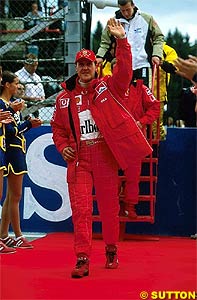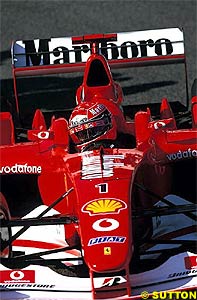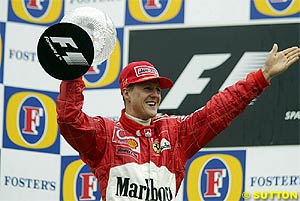
Atlas F1 Senior Writer
Michael Schumacher continued his flawless season with another victory at the Belgian Grand Prix, where he had made his Formula One debut exactly 11 years earlier. The win, as so many during his career, was an uncontested one and another example of Schumacher's quest for perfection. But what are the key ingredients behind the German's success? And what will it take for his rivals to stop him? Thomas O'Keefe tries to find out
I love the idea that he hired Dan Gurney to drive for Ferrari in 1959 even though Dan crashed a Formula One Ferrari Dino 246 in his test drive at Monza, a car in which Jean Behra had just set a new lap record! And I love the idea that when the Pope came to Maranello to visit, Enzo Ferrari, then ailing, was too sick to see him so Ferrari driver Gerhard Berger did the honors. I am glad we still have a circuit named after the man himself and the dead son Enzo worshiped - the Enzo and Dino Ferrari Autodrome at Imola. As no less an authority than Bernie Ecclestone said on the occasion of the celebration in Rome of Ferrari's 50th Anniversary in 1997: "Mr. Ferrari was Mr. Formula One. And I wouldn't like to think of Formula One without Ferrari. I don't know where we would be without Ferrari. In another 50 years, you'll see the Formula One Ferrari's here."
As for Michael Schumacher, I admire him too, as a driver, as a sportsman and as a leader. Eleven years ago at Spa, Michael was a 22 year-old learning the track on his bicycle and sleeping in student dormitories in the woods of the Ardennes forest. In that short space of time, he has almost single handedly and certainly single mindedly taken this sport of Grand Prix racing by storm. We have seen him be brilliant in the dry and mesmerizing in the wet, we have seen him be opportunistic; we have seen him be dodgy; we have seen him get carried away with himself and become arrogant and finally, we have seen him boil with anger and lose his temper on rare occasions and even rarer still, we have seen him cry, moved to tears at the very mention of the name "Senna" when Schumacher broke one of Ayrton Senna's records at Monza in 2000. As a driver, he has almost no flaws, and as a team leader not even Senna was his equal in being able to galvanize people into becoming a team.
The problem that we have now is that Michael Schumacher has no peers. The Romans had an expression, primus inter pares - first among equals - for their leaders, but even the precise language of Latin fails us here in describing what Schumacher has become. For although he may have broken every record in the book except Senna's 65 poles (and at 48 pole positions Schumacher is working on that!), unlike Jim Clark, he has no Graham Hill or Dan Gurney or John Surtees to keep him honest, no Stirling Moss or Tony Brooks to measure himself by as Fangio had, and only briefly did Schumacher have Senna to drive against, when Senna himself had talent like Prost, Mansell and Piquet to test his mettle against throughout his career.
Which means, ironically, that as Michael Schumacher enters what may be the last two seasons of his glittering career, he above all others has to hope that those elite Japanese engineers or those German and English engine builders who work for Honda, Toyota, BMW and Ilmor will come up with competitive packages that will permit Juan Pablo Montoya and Kimi Raikkonen to stretch their legs and have a go at Ferrari in competitive cars that will help either burnish or tarnish Michael Schumacher's reputation as the Greatest Grand Prix Driver Ever. Otherwise, we will never know for sure if we are really witnessing the very best driver of all times as the record books now attest, or simply a great driver in the best equipment.
We comfort ourselves with the notion that there are pendulums and cycles to all things and that sooner or later, the lopsidedness currently prevailing in favor of Ferrari will swing back into balance, but with the Ferrari team as strong as it is at all levels, it is honestly difficult to predict when and why we should expect the other teams to come up with the kind of technical advance or breakthrough that will slow the Juggernaut from Maranello long enough to let the others tuck in to the Ferrari slipstream.
I happened to be at the European Grand Prix at an overcast Nurburgring on September 26th, 1999, a day when some mighty strange things happened. Johnny Herbert won the wet/dry race in a Stewart-Ford (the only win for that constructor and Herbert's last win); Marc Gene in a Minardi finished in sixth place - Minardi's last points before this year - and his Minardi teammate Luca Badoer was also running up in the points in the latter stages of the race until the car gave up, and he cried like a baby at the heartbreak; but God works in mysterious ways and Badoer found redemption as a test driver for Ferrari, going from the worst car to the best car in one fell swoop.
The other stunner was that Ferrari was not on the podium that day at Nurburgring, after the mechanics had made a mess of then-Ferrari driver Eddie Irvine's pitstop when he had come in on short notice for tires in the variable weather conditions and the team was running around helter skelter to find the correct tires. (Michael Schumacher was still recuperating from his accident at Silverstone and would not be back until the next race, in Malaysia). From that day to this, for 50 races, at least one of the Ferrari drivers has been on the podium. Out of that ignominious performance at Nurburgring, Ferrari has nurtured a whole generation of mechanics and engineers whose dedication to detail three years hence knows no bounds.
In the past, one-car dominance has often come because of innovative technical advantages like the placement of the rear-engine, the development of active suspension, the use of carbon fiber material for the chassis, or having a tire compound that was temporarily superior to all the rest. But these periods when a marque like Lotus, McLaren, Williams would prove to be preeminent were evanescent and rarely lasted for more than a season. And the ingredient that set the dominant car apart from the rest was apparent for all to see and just a matter of copying to catch up.
In Ferrari's case, there does not seem to be something obvious to copy, something that the other teams can point to and say 'hire me someone who can deliver that missing component to the team'. Michelin comes in for a drubbing because, now in their second season, their tire is not on a car that is a consistent winner. But does anyone really believe that it is the Bridgestone tire and some magic chemical from Japan not known in Clermont-Ferrand that is Ferrari's magic potion? Ask the other Bridgestone runners who are finishing down in the field.
The Ferrari engine - the belly of the beast - is surely a key component to the team's success and has historically been a Ferrari strong point going back to the V12s of yesteryear, though earlier Ferrari motors never reached the reliability quotient the current V10s have established. But put all the Formula One engines on a dyno, and it is suspected that BMW's and possibly Toyota's would show more raw horsepower than the Ferrari V10.
So amazingly it comes down to the driver and his chef-like mastery of mixing in the ingredients to perfection, and it must be said that in that department Michael Schumacher is head and shoulders above the rest. If there were a personal dyno machine or rolling road to measure driver performance, we would be able to document what we know intuitively about this man: that Michael has the car control of a Montoya or Raikkonen when needed, the clinical perfection of a Prost or a Barrichello, the daring of a Jacques Villeneuve or Felipe Massa and the strategic mind and inner calm of a Senna, Moss or Fangio, all of whom seemed to be able to race, talk and wave all at the same time while their contemporaries were holding on for dear life.
Having travelled so quickly and so far from being his brother Ralf's go-kart mechanic in Kerpen, Germany to the world's most astonishing sportsman, will Michael Schumacher ever be beaten as even Senna, Clark, Moss and Fangio were in the last years of their career, or will he retire at the top before he stops finishing off the podium?
One thing about Michael Schumacher is that he is not a particularly good loser. You can't imagine him testifying in favor of Montoya at an FIA hearing on a matter of a rule infraction in a manner that would give points to Montoya in the middle of a Championship fight. Yet Moss did that in 1958, when at Oporto in the Portuguese Grand Prix, he was in the best position as a witness to the events in question to testify that his rival Mike Hawthorn had not run afoul of a rule in pushing his car back on the course after Hawthorn had an off. Based upon what Moss told the stewards, Hawthorn's disqualification was lifted, his second place was reinstated and points were earned by Hawthorn that day in August 1958 that would help Hawthorn win the 1958 World Drivers' Championship over Moss in October 1958 by one point.
Nor is it for Michael to permit your teammate to win because it happens to be the nice thing to do, as Fangio may have done for Moss at the 1955 British Grand Prix when Moss won with Fangio lagging back, Moss's first Grand Prix win in front of his home crowd on the first occasion when Aintree hosted a Grand Prix. To Fangio's dying day Moss was still not sure if he really won or whether the Gentleman from Argentina let him win. Even when Rubens Barrichello wins these days, Michael has to put in a fastest lap as a wink to the historians and cognoscenti that he could have won if he wanted to.
Not for Michael will be ending his career chasing the next best thing, as Senna did in jumping ship from McLaren to Williams in 1994, desperate to get back with a winner. Nor is Michael likely to go back to one of his old teams like Benetton/Renault or to a more natural constituency, Mercedes-Benz at McLaren, because of a financially enticing offer that can't be refused.
He will go out as he came in, a quiet perfectionist in all things who, as soon as he feels in the cockpit his concentration or sixth sense going off or his enjoyment of racing flagging outside of the cockpit, will pack it in with no regrets and be gone: no humbling backsliding in his career, no passing of the torch to a usurper or pretender to the throne, just a dignified victory lap at Suzuka someday that will mark both the end of a season and of one of the most remarkable drivers of any era, and possibly the tears one more time.
I for one will miss his artistry and only hope that before that swan song at Suzuka is sung the likes of Ford, BMW, Mercedes-Benz, Honda or Toyota, on Michelins or maybe even Goodyear tires, can at least mount a credible challenge to the team from Maranello so that we and Michael Schumacher can see competitions and not just coronations before Michael turns over the reins of the Prancing Horse to someone else and the teams from Oxfordshire, Japan, Stuttgart, Munich and Cologne take their turns at the wheel.
It is a race against time, so to those young design engineers and team managers out there, keep those CAD designs crunching through those computers, keep those dynos running full tilt and keep those wind tunnels going 24/7 trying to harness the ocean of air around us: we have perhaps 24 months left to put the Champion to his final exams. Let's hope we don't fail him since he certainly hasn't failed us.
I am beginning to feel the way those three fluorescent orange cones at the Bus Stop chicane looked at the end of the Belgian Grand Prix at Spa on September 1, 2002: beat, up, worn down and flattened by Ferrari and Michael Schumacher.
 Don't get me wrong. I love Ferrari and what it has meant to the sport of Grand Prix racing. I love the idea that Alfa Romeo fired Enzo Ferrari as its race team manager at Alfa Corse and then after honoring his non-competition agreement with Alfa, Ferrari came back into the sport with a car bearing his own name and beat the team that had fired him in the 1952 Formula One World Championship, 50 years ago this year. I love the idea that Enzo Ferrari sold his sports cars to rich Americans from Greenwich, Connecticut to Hollywood, California so that he could finance endurance racing at Le Mans, forays into the Sicilian countryside like the Targa Florio or into the back roads of Mexico in La Carrera Panamericana and, of course, racing the Grand Prix Ferrari's on all the great road racing circuits of the world from AVUS to Zandvoort.
Don't get me wrong. I love Ferrari and what it has meant to the sport of Grand Prix racing. I love the idea that Alfa Romeo fired Enzo Ferrari as its race team manager at Alfa Corse and then after honoring his non-competition agreement with Alfa, Ferrari came back into the sport with a car bearing his own name and beat the team that had fired him in the 1952 Formula One World Championship, 50 years ago this year. I love the idea that Enzo Ferrari sold his sports cars to rich Americans from Greenwich, Connecticut to Hollywood, California so that he could finance endurance racing at Le Mans, forays into the Sicilian countryside like the Targa Florio or into the back roads of Mexico in La Carrera Panamericana and, of course, racing the Grand Prix Ferrari's on all the great road racing circuits of the world from AVUS to Zandvoort.
 Lately, Michael seems almost embarrassed in the post-race press conferences about the drubbing being meted out every two weeks to the rest of the grid; his partner in excellence, Ross Brawn, also seems amazed and puzzled that the opposition has been so slow to catch up. I have noticed that even the "world feed" TV producers have begun to focus on the other races within a race, as at Spa, so saturated are we with the Red Car.
Lately, Michael seems almost embarrassed in the post-race press conferences about the drubbing being meted out every two weeks to the rest of the grid; his partner in excellence, Ross Brawn, also seems amazed and puzzled that the opposition has been so slow to catch up. I have noticed that even the "world feed" TV producers have begun to focus on the other races within a race, as at Spa, so saturated are we with the Red Car.
 Is it really the svelte chassis that Rory Byrne's pencil box and the 24/7 windtunnel have produced that is the secret ingredient of the Ferrari F2002? Aerodynamics being the blackest of arts, we mere laypersons can never know whether those aero bits like flick ups on the air box that make Schumacher sometimes look like he has horns of the devil are really the tiny touches that give the Ferrari F2002 its winning edge, but we cannot help but notice that when pieces as large as barge boards fall off in accidents the performance of the car does not seem to decline as far as you would think. No, the students of fluid dynamics have us all dazzled and confused, but Adrian Newey's pencils in Woking can't be all that much better than Byrne's pencils in Maranello.
Is it really the svelte chassis that Rory Byrne's pencil box and the 24/7 windtunnel have produced that is the secret ingredient of the Ferrari F2002? Aerodynamics being the blackest of arts, we mere laypersons can never know whether those aero bits like flick ups on the air box that make Schumacher sometimes look like he has horns of the devil are really the tiny touches that give the Ferrari F2002 its winning edge, but we cannot help but notice that when pieces as large as barge boards fall off in accidents the performance of the car does not seem to decline as far as you would think. No, the students of fluid dynamics have us all dazzled and confused, but Adrian Newey's pencils in Woking can't be all that much better than Byrne's pencils in Maranello.
Please Contact Us for permission to republish this or any other material from Atlas F1.
|
Volume 8, Issue 36
Articles
Schumacher's Living Room
Pummeled by Perfection
Ann Bradshaw: View from the Paddock
Belgian GP Review
The 2002 Belgian GP Review
Technical Review: Belgian GP
Rude Awakening
The Best of Williams
Stats Center
Qualifying Differentials
SuperStats
Charts Center
Columns
Season Strokes
Elsewhere in Racing
The Grapevine
> Homepage |